The Congress Blu-ray Movie
HomeThe Congress Blu-ray Movie 
Blu-ray + Digital CopyDrafthouse Films | 2013 | 123 min | Not rated | Dec 02, 2014
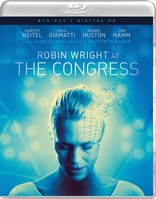
Movie rating
6.7 | / 10 |
Blu-ray rating
| Users | 0.0 | |
| Reviewer | 4.5 | |
| Overall | 4.5 |
Overview
The Congress (2013)
An aging, out-of-work actress agrees to sell her entire identity to a media conglomerate through sophisticated digital scanning. Years later, she discovers that technology has progressed even further than she anticipated.
Starring: Robin Wright, Harvey Keitel, Jon Hamm, Kodi Smit-McPhee, Danny HustonDirector: Ari Folman
| Sci-Fi | Uncertain |
| Animation | Uncertain |
| Action | Uncertain |
Specifications
Video
Video codec: MPEG-4 AVC
Video resolution: 1080p
Aspect ratio: 1.85:1
Original aspect ratio: 1.85:1
Audio
English: DTS-HD Master Audio 5.1 (48kHz, 24-bit)
Subtitles
English SDH
Discs
50GB Blu-ray Disc
Single disc (1 BD)
Digital copy (as download)
Playback
Region A (locked)
Review
Rating summary
| Movie | 4.5 | |
| Video | 5.0 | |
| Audio | 4.5 | |
| Extras | 3.5 | |
| Overall | 4.5 |
The Congress Blu-ray Movie Review
Who Were You (Do I Really Wanna Know)?
Reviewed by Michael Reuben December 2, 2014Even as he was releasing his multi-award-winning 2008 animated documentary, Waltz with Bashir, Israeli director Ari Folman was already planning his next, even more ambitious undertaking, The Congress, which would take another five years to complete. Inspired by Polish science fiction writer Stanislaw Lem's 1971 novel, The Futorological Congress, Folman envisioned a dystopian future in which people surrendered their freedom to an unreal world not simply through the magic of drugs (as Lem had forecast) but through the digital machinations of the entertainment industry. As a filmmaker himself, Folman thought he knew all the industry's tricks, but in making The Congress, he discovered that reality was catching up to his vision faster than he anticipated. Scenes that he had scripted as fantasy were becoming technologically feasible, and significant parts of The Congress were rewritten during production to incorporate the latest breakthroughs. Like Waltz with Bashir, The Congress begins with what appears to be solid reality, then launches into a realm where nothing is certain, including time, space and identity. The same team that created the nightmare worlds for Waltz with Bashir went even further, imagining countless fantasy landscapes, some friendly, some not. About 60% of the film is animated. Wherever you think The Congess is going, you're probably wrong. At the end, though, it is possible to look back and realize that Folman's story has an organic integrity that unifies its many shifting layers and makes its strange world worth visiting repeatedly.
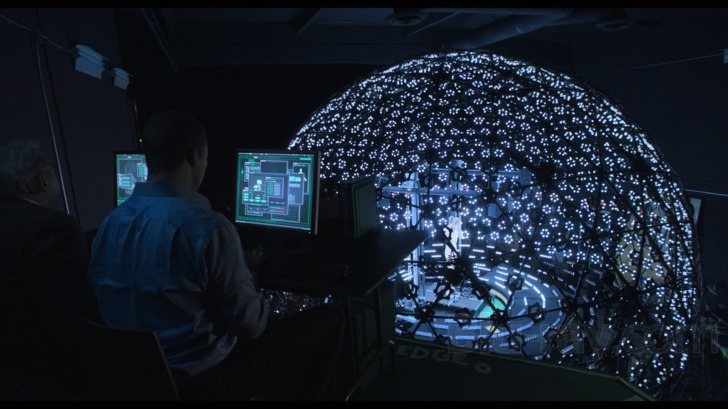
At the center of The Congress is Robin Wright, who is played by the real Robin Wright and shares key elements of her biography. The film's Robin Wright is a character constructed by the actress and Folman to be entirely separate from the actress who plays her, but Folman's essential strategy is to blur the line between fiction and reality from the outset. Thus, The Congress' Robin Wright is chiefly remembered for her radiant performances in The Princess Bride and Forrest Gump. Since then, however, she has rejected many attractive offers, never starred in a box office hit, and acquired a bad reputation in the industry. In the film's opening scene, she is mercilessly reproached by her long-time agent, Al (Harvey Keitel, in one of his best performances), who wants her to accept an unusual offer from a huge entertainment conglomerate, Miramount. The offer, as explained by a reptilian senior executive, Jeff Green (Danny Huston), is literally the last contract she'll ever sign, because Miramount is buying her entire identity. Everything she is as an actress will be digitized, and the studio will no longer need her participation to make movies. In exchange, she must agree never to act again. Al supplies an ambitious young attorney named Steve (Michael Stahl-David) to represent Robin in negotiating the contract for this new frontier in entertainment law, where there are no opportunities for re-negotiation once the studio has the actor's digital self. Though Robin initially refuses, she is ultimately forced to accept the contract because of the cost of treating her son, Aaron (Kodi Smit-McPhee), for a degenerative disease that is slowly destroying his sight and hearing, despite the efforts of a sympathetic specialist, Dr. Baker (Paul Giamatti, who wanted to be part of the film even though he was mystified by the script). Many elements of this long opening section of The Congress make it clear that Robin's greatest loyalty in life is to Aaron and his older sister, Sarah (Sami Gayle). In one of the film's most powerful scenes, Al uses this fact—and everything else he knows about Robin from their long relationship—to elicit the intense emotions from her that the digital scanners require for a successful "capture". (The sequence was shot in a real scanning facility that Folman and his crew were shown during production). The scene, which took weeks to rehearse, is an acting tour de force that represents the last gasp of traditional human interaction before both Robin and Al surrender to the digital future that is sweeping them both aside. Twenty years later, Robin is invited to speak at the "Futurist Congress" in Abrahama City hosted by Miramount, which has now become "Miramount-Nagasaki". As Peter Green predicted, the technology that transformed Robin into a digital character has been rendered obsolete, although advertisements can still be seen for the sci-fi franchise called Rebel Robot Robin in which her avatar continues to star. Current technology allows people to become animated characters in a landscape that resembles Who Framed Roger Rabbit? 's Toon Town, if it had been drawn by Max Fleischer. Abrahama City is just such a "restricted animated zone", and the "Futurist Congress" is the occasion for a Steve Jobs-like figure to announce Miramount-Nagasaki's latest advance: consumable characters. No longer will viewers have to watch Robin Wright in movies made by the studio. They can drink her in a milkshake and become her. They can become anyone, anywhere, at any time, and animated zones will no longer be restricted. Tomorrow when you leave here, announces the corporate cheerleader, it will be as if you take Abrahama City with you. Robin's presence at the Futurist Congress is intended to be much like that of a dutiful star at a PR event. Her job is to say "great idea!" and no more. Then she can head back home to Aaron, now a young man. Ironically, it is Aaron's condition that predicted the developments announced at the Congress. As Dr. Baker described twenty years ago, Aaron was taking in all the sensations he could so that, when his hearing and sight failed, he would have a rich supply of raw materials for a vivid interior life. Miramount-Nagasaki is offering something similar to everyone, but instantly and without effort—and Robin objects to participating in such a commercial venture. So, apparently do others, because the Congress is attacked by some sort of rebel force. Or maybe Robin just imagines that, just as she dreams about violating her contract the night before the Congress. Indeed, the last third of The Congress demonstrates the unpredictability of the imagination, as the film shoots off into unexpected places that, like so many dreams, are strange and yet oddly familiar. Robin may be rescued from the rebel attack by a cartoon figure named Dylan Truliner (voiced by Jon Hamm), who seems to know her. She may be executed at the hands of Gestapo-like police led by someone who resembles Jeff Green. She may be cryogenically frozen by a man who looks like the former cinematographer (Christopher B. Duncan) who scanned her for Miramount twenty years ago. She may fly kites, as Aaron used to, or she may grow wings and fly herself. But these and many other experiences may be no more than vivid hallucinations unleashed by the inventive chemicals synthesized by Miramount-Nagasaki. What seems reasonably certain, however, is that Robin does ultimately awaken into the "real" world, because The Congress has one final live-action sequence near the end that appears to draw a clear distinction between reality and the chemically-induced fantasyland that each individual creates for him- or herself. What Robin finds in the non-animated world is very different from what she last saw before entering Abrahama City. And the choices that she must make there are not easy.
The Congress Blu-ray Movie, Video Quality 
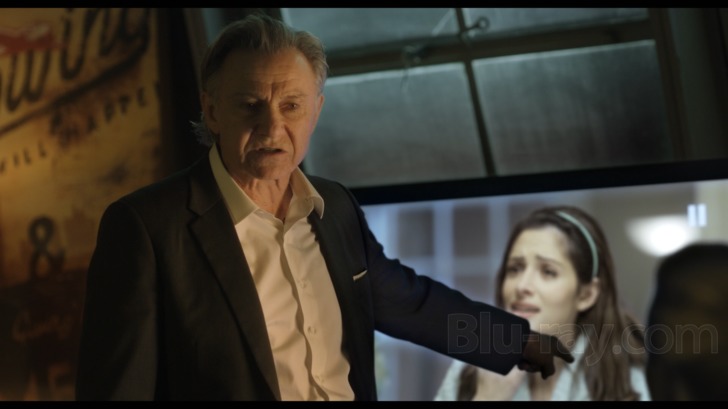
Both the live-action and animated portions of The Congress were shot digitally, but unlike the fictitious studio in the film, the team of animators and the live-action cinematographer, Mikal Englert, did not eliminate real actors from the equation. Even for the animated sequences, the lead actors performed in pantomime, and the animators used their gestures and expressions as references for storyboards, which were then animated digitally. (As in Waltz with Bashir, no rotoscoping was used.) Drafthouse Films' 1080p, AVC-encoded Blu-ray has presumably been sourced directly from digital files and, except for possible differences in compression and disc authoring, should be identical to versions released in other regions. Both the live-action and animated sequences are superb, with exceptional clarity and detail and an expressive palette of colors that ranges from the riot of hues greeting Robin when she enters the restricted animated zone to the dark recesses when she and Dylan are hiding underneath Abrahama City. The intense white LED lights of the scanning session register their intensity without blooming, and the pools of blackness outside from which Al speaks to Robin while she is being scanned are appropriately dark and inky. As strange and unsettling as it often is, The Congress is filled with images to be savored and revisited, and the Blu-ray's quality facilitates that experience. Drafthouse has mastered the film with an average bitrate 31.996 Mbps. Once you see the complexity of some of the animated sequences, you will understand why.
The Congress Blu-ray Movie, Audio Quality 
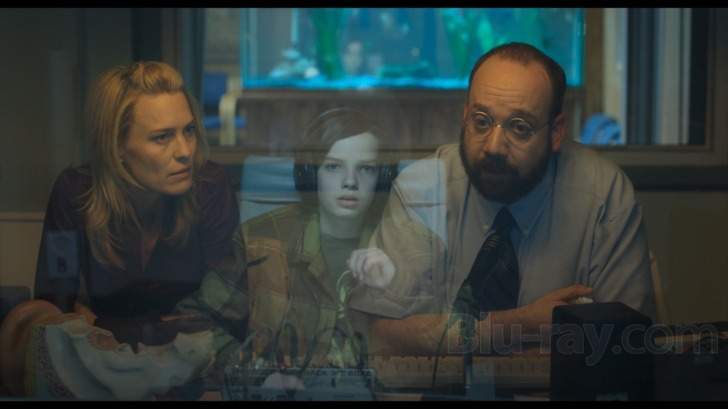
A running theme in Folman's commentary whenever he discusses the film's soundtrack is his desire to find the right balance between sounds. It is clear that he did not want sound effects to draw attention to themselves, thereby interrupting the dream-like spell of the film. The Congress' lossless DTS-HD MA 5.1 mix is filled with interesting effects that come and go throughout the surround field, including the complex of sound that accompanies Aaron's kite-flying (which is different for Aaron than for those around him), the various tones Dr. Baker uses to test his hearing (heard from Aaron's perspective, as he reads the lips of the doctor and his mother talking about him), the surge of power that Robin experiences in the scanning booth, the riot of voices and cartoon effects that she encounters as she transitions to animation in Abrahama City—and many other examples. But none of these moments overpowers one's hearing with the "Listen to me!" sensation that makes a Blu-ray disc so-called "demo material". The effects have been dialed down to a point where they seem to slip naturally into place with the increasingly strange events transpiring onscreen. The reflective, even doleful orchestral score by Max Richter (a veteran of Waltz with Bashir) has more of a presence than any of the effects, and that, too, is by design.
The Congress Blu-ray Movie, Special Features and Extras 
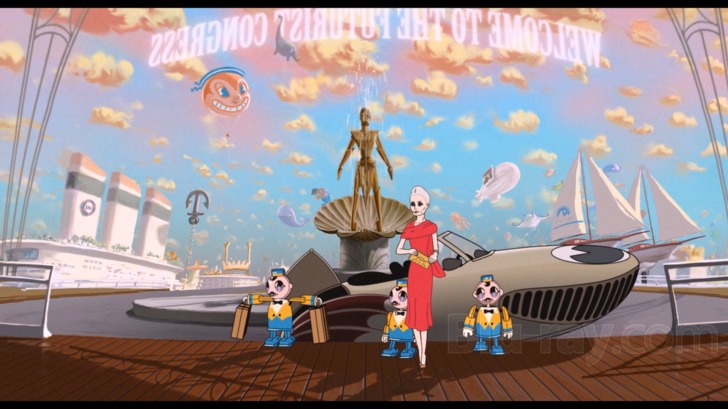
The extras overlap with, but are not identical to, those contained on the Region B Blu-ray previously released by ARP Sélection. Of particular note is that Drafthouse's disc replaces the "Making Of" featurette with an informative interview with Robin Wright.
- Commentary with Director Ari Folman, Production Designer David Polonsky and Animation Director Yani Goodman: The more substantive portion of the commentary accompanies the live-action segment, where Folman is speaking solo. There he discusses the project's long gestation, many of its themes and his collaboration with Wright. Once the film enters its mostly animated portion, Folman is joined by Polonsky and Goodman, and the tone changes. The three collaborators cannot resist laughing and joking, and one must listen carefully for the tidbits of information that slip out between the wisecracks. Of perhaps greatest interest (and frustration) is the revelation that nearly an hour of material was cut from the film late in post-production. Maybe someday these deleted scenes will be made available. (Note: Internal references indicate that this is the same commentary included on the Region B Blu-ray.)
- Robin Wright at The Congress (1080i; 1.78:1; 9:26): This interview with the film's star allows her to present her recollection of the initial meeting with Folman in which they agreed to undertake the project, to reflect on the film's themes and to describe the production process.
- :30 Spot (1080i; 1.78:1; 0:33): A brief teaser.
- Trailers
- Theatrical Trailer
- Borgman
- Mood Indigo
- The Visitor
- Wrong
- Booklet: Drafthouse's insert for this release includes stills from the film, a "director's note", a "director's Q & A", and film and disc credits.
The Congress Blu-ray Movie, Overall Score and Recommendation 

The Congress is a challenging and provocative film, the kind that will not yield all or even most of its secrets on a single viewing. It's no accident that Folman's favorite film of all time is Stanley Kubrick's 2001: A Space Odyssey, a film that has inspired wonder in many (and boredom in some) but must be seen more than once to be fully enjoyed. In its own way, The Congress is just as ambitious, and Folman is the first to admit that he cannot be the final arbiter of his accomplishment. In the director's Q&A reprinted in the booklet insert, he says: "I think this is the beauty of filmmaking: once you finish your work, it's not up to you anymore; it's up to the audience. All I need to do now is sit back and listen to them. Maybe then I'll have a chance to learn what I did." Highly recommended.
Similar titles
Similar titles you might also like

Upgrade 4K
2018

Always Shine
2016

Message from Space
Uchu kara no messeji
1978

Starchaser: The Legend of Orin
1985

Super Inframan
Infra-Man / Zhong guo chao ren / Jung gwok chiu yan / 中國超人 / Theatrical Version + US Theatrical Version
1975

Assault Girls
2009

Pacific Rim: Uprising 4K
2018

Johnny Mnemonic: In Black and White
1995

The Last Sentinel
2007

Colossus: The Forbin Project
1970

Expect No Mercy
1995

Sleeper
The Woody Allen Collection
1973

Robot Jox
1989

20,000 Leagues Under the Sea
1916

The Shape of Things to Come
1979

Journey to the Far Side of the Sun
Doppelgänger
1969

Aniara
2018

Light the Fuse... Sartana Is Coming
Una nuvola di polvere... un grido di morte... arriva Sartana / Gunman in Town
1970

Fahrenheit 451
2018

Replicas
2018
